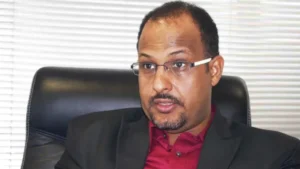In this exclusive interview, Africa Hyperscalers Media speaks to the new CEO of TelCables Nigeria, Fernando Fernandes. He speaks on Africa’s digital infrastructure gap, Angola Cable’s efforts to bridge this divide and the TelCable’s outlook for the Nigerian ICT industry.
About TelCables Nigeria
There is tremendous growth potential within the Nigerian market with an increasing number of businesses and enterprises looking to expand their digital footprint and have access to secure and innovative ICT solutions.
TelCables Nigeria was recently established to serve the growing Nigerian markets and markets in surrounding countries. We are in a unique position to offer both wholesale carrier services as well as tailored IP-Transit and connectivity and Cloud solutions to businesses and enterprises in the region.
Our parent company, Angola Cables is rapidly evolving networks and backhaul systems to provide low-latency, resilient, and secure connections to customers in the USA, Latin America, Europe, Asia, Africa, and across the world, and so we have a global presence that offers local solutions that are ideally configured for the unique needs and demands of businesses across Africa.
Business outlook
From a Telecoms / ICT perspective, Nigeria’s Information and Communication Technology (ICT) sector in real terms grew by 8.6 percent (year-on-year) in the second quarter (Q2) of 2023, the highest in three years – which is a positive development and bodes well for future business prospects but the market remains competitive. The increasing adoption of IoT-based devices across various industries, including BFSI, IT and Telecom, Retail and E-commerce, and others, is propelling the ICT technology industry in Nigeria.
Nigeria’s ICT market is gaining traction with advanced technology, such as cloud computing. Artificial intelligence is also extending its application across the end-user segment, fueling market growth over the next five years. The increasing infrastructure developments, such as smart city and data center construction, will also drive ICT growth over the next five years. Key players in the ICT market are focusing on expanding their businesses and strengthening their ICT services through collaborations and partnerships.
The demand for the adoption of IT services and telecom services has been on the rise and this is being augmented by technology demand growth. Also following the COVID pandemic, companies upgrading IT infrastructure to support remote working amid shutdowns may shift workloads to the public and private cloud. Over the coming years, this is expected to drive the demand further as enterprises move towards cloud and remote working models, creating new growth opportunities for the ICT market.
Challenges and opportunities for TelCables in the West African market
In Africa, there are still several challenges impeding the adoption of cloud services either via extended networks or via data centers. Some of these issues include:
• Legislative or regulatory bottlenecks: Many companies, entities are unsure of the legal regulations (or if there are any that govern trans-border data sharing; the security of data and the proprietary of certain data)
• There has been a rapid adoption of cloud services following the increase in bandwidth across many African countries but there still needs to be more investment in infrastructure and data centers to improve Africa’s capacity to deliver Cloud and complex network services.
• Much of the responsibility will lie with the sector and individual companies to invest in talent and to provide employees, and job seekers the tools they need to educate themselves and acquire experience.
• Governments and Public / Private partnerships will also be key in raising the overall level of IT skills required to drive the industry forward.

Silver bullet to address a pertinent issue in integrated data center and connectivity business
Well, with one bullet and investment in more infrastructure and data Centre integration, we could actually benefit and commercialize IT solutions with advanced system integration. This way, we can directly own and operate our global infrastructure, and with negotiation at scale, we could better shape the commercial selling of full-stack services and have cost-savings that we could pass to customers.
Investment in infrastructure and services by TelCables and Angola Cables
We believe that with new cable builds coming on stream and on the horizon, the new game will not be about investing large amounts of capital into building new infrastructure. Rather, it will all be about sharing existing infrastructure through capacity exchange agreements that will help customers connect to their global locations and customers, quickly, easily, and efficiently.
New, open-access technologies are playing an increasing role in connecting people and communities. We believe that a more modular approach may result in quicker gains in terms of diversifying connectivity in South America. Focus should be placed on exploring existing technologies that will provide access to localized servers that have direct connections to IXPs and PoPs in Latin America and in other parts of the world.
Local peering can also bring down the cost of usage, which is a huge factor for many impoverished people across the world. By establishing localized digital ecosystems, organic growth and access to networks will automatically be encouraged.
Data center, edge, cloud, and connectivity industry in 5-10 years
• The construction of data centers in Africa has been increasing to support the demand for local hosting, cloud services, and disaster recovery solutions. We can expect to see more cable operators teaming up with neutral data centers to connect and expand their networks and possible routing options.
• Currently, there are 51 active IXPs stretching across 36 African countries, the big gap is the connectivity intra-Africa. It is imperative to create paths to neighbor cities, countries, regions, and continents. Companies like Angola Cables and its subsidiaries, TelCables Nigeria and TelCables South Africa will continue to play a constructive role in connecting communities and businesses across Africa, providing them with a single point of solution for digitalization, local and international access to content and tier 1 networks in Africa, Europe, Americas, and Asia.
• The Angola Cables’ network recently reached the highest peak of 12 664 Terabits of data traffic across its international transmission and data internet backbone. The increase in traffic has been recorded over its subsea cable network which incorporates the SACS, Monet, and WACS cables and its onward connections to Europe and Asia. This is a historic milestone in the volume of traffic over its robust global network. Putting these statistics into perspective, 1000 terabytes equate to about 500 billion pages of text – and 12 times that amount of data is going through our network every second. Simply put, it is an extremely large amount of data.
Africa’s big gap is the connectivity intra-Africa and it is imperative to create paths to neighbor cities, countries, regions, and continents. Companies like Angola Cables and its subsidiaries, TelCables Nigeria and TelCables South Africa will continue to play a constructive role in connecting communities and businesses across Africa, providing them with a single point of solution for digitalization, local and international access to content and tier 1 networks in Africa, Europe, Americas, and ASIA.
Clouds2Africa project in Nigeria
Clouds2Africa offers a high-performance, cost-effective cloud solution. The establishment of a node in Nigeria gives businesses anywhere in Africa the option to connect to more than 300 nodes worldwide. Clouds2Africa also offers fixed-term or ‘Pay as You Go’ payment options for individuals or established enterprises seeking to host content on a versatile and stable cloud platform.
Our cloud solution is ideally suited for SMME’s, startups, and other businesses looking to expand their digital footprint. Medium and large enterprises can leverage bespoke cloud backup and secure virtualization solutions, companies of all sizes can also access other solutions and services, including direct access to more than 66 data centers across the world; secure IP-Transit and peering; ‘As a Service’ solutions and SD-WAN.
Shortlist for Connectivity Project of the Year at the Africa Tech Festival Awards
Yes, our solution, the Global Data Centre Interconnection (GDI), earned us the nomination. Global Data Centre Interconnection (GDI) from Angola Cables empowers network service providers to offer a host of managed services across several data centers and internet exchange points connecting local as well as international digital ecosystems in Africa, Europe, and the Americas, through a single manageable network.
This solution benefits ISPs, carriers, OTTs, multinationals, gaming entities, corporate and financial sector clients – or any network operators wanting to seamless connect to major international data centers and Internet Exchange Points (IXPs) through express, low latency routings.
Currently Angola Cables, through its partnership with Flexential® can connect African enterprises with public or private networks to over 40 key data center hubs across the United States.
Secure, dedicated interchange connections are also available through advanced data center infrastructure provided by leading companies such as Equinix, Interxion, Teraco, Ascenty, Digital Realty, and others, customers can select their preferred international connectivity options or dedicated links as their business or enterprise requires.
Given the capability and flexibility of the GDI solution, many businesses and users across Africa can export content and data to multiple destinations or expand their cloud or Edge capabilities as the needs of the business may require.
In August 2023, traffic across the Angola Cables’ backbone infrastructure recorded its highest traffic peak of 12,664 Tbps. This is evidence of the growing appetite from businesses in Africa to connect and share content with the rest of the world through solutions such as the Global Data Center Interconnection (GDI). Due to the solution’s built-in, layered security, customers can be assured that their data remains private and secure.





